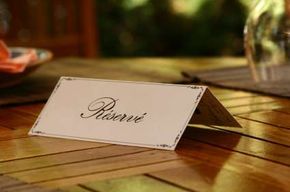When you register with a Web site for an online reservation, it will ask for your e-mail address and a phone number. Then, it will ask if you want to receive periodic e-mails with news, updates and special offers from the company. Many people respond "no" to this question to avoid receiving tons of unwanted messages.
Businesses and their marketing departments know this, but they also know the reservation confirmation e-mail can be used to sell new products, services and special promotions. As a user, you're obligated to receive this e-mail, because it often contains a confirmation number or billing information. You don't have to read it, of course, but it's the job of the marketing copywriter to convince you that it's worth your time.
It's become popular for confirmation e-mails to be rich, colorful, HTML documents that resemble Web pages. These ads and links are meant to draw the attention of the reader away from just the details of the reservation. For marketers, this is a golden opportunity to up-sell or cross-sell related services, perhaps at a discounted price.
Another marketing technique that employs reservation confirmations and other automated reminders is the idea of a loyalty program or a frequent customer program. In this type of program, a customer will sign up or opt-in to receive periodic e-mails or text messages from a company containing information on new products, last-minute discounts and special deals available to "members only."
Loyalty programs can benefit both consumers and businesses. Consumers can choose to receive information only about certain products and services, helping marketers target their campaigns more directly. The consumers then get special access to discounts on products they actually like, and the business can build brand loyalty. For some hospitality businesses, it's also a great way to book reservations for less-popular dates and times.
A spa, for example, could send daily e-mails to clients who have signed up for its loyalty program. The e-mails may feature last-minute specials for a massage or pedicure in the morning or early afternoon, when business is typically slower. A hotel or airline can send weekend specials to off-season destinations (like London in January) for dramatically reduced rates. A restaurant could advertise daily, "Early Bird" dinner menus to lure in hungry office workers.
The future of reservation confirmations appears to be moving toward text messages. As more and more cell phones include the ability to browse the Web and receive rich text messages with HTML, images, audio and video, marketers can offer even more features in their reservation confirmations.
Digital Alchemy recently introduced a software product called Claire that allows hotels and resorts to send timely, personalized information to guests' cell phone or BlackBerry Web browsers before, during and after their stay.
In addition to the basic reservation confirmation, a guest could receive airport shuttle and taxi information several days before his trip. After check-in, he could receive daily e-mails about upcoming activities, spa and restaurant specials, links to sign up for tee times on the golf course, and "phone-only" discounts. After check out, the guests could be sent a link to a quick survey to improve customer service.
For lots information about reservation confirmations and related topics, check out the links on the next page.


